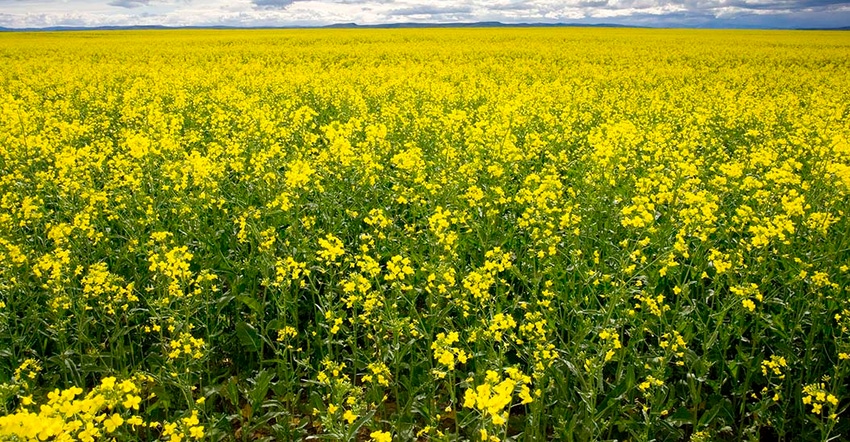
by Jen Skerritt
In the heart of Canada’s bread basket, a Richardson International Ltd. processing plant stands as a testament to what may be the country’s most successful agricultural experiment.
Farmers across the Prairie Provinces are planting a record acres of canola, a crop that didn’t exist about four decades ago but now is the nation’s biggest, sown on more land than spring wheat. Richardson was the first company to market canola oil. It has since expanded capacity at factories like the one in Lethbridge, Alberta, as global demand exploded and Canada became the top exporter of an oilseed used in everything from salad dressing to french fries.
Richardson’s facility now spans six square blocks -- a warren of crushing machines, conveyor belts, railroad links and grain silos devoted entirely to canola. After a C$120 million ($89 million) upgrade to expand capacity by 55%, it will be able to process 700,000 metric tons annually, boosting exports of oil and related products including margarine and buttery popcorn topping.
“It’s almost a constant turnover” of jugs, barrels and bottles of oil shipped to grocers, fast-food restaurants, hospitals and bakers every day of the work week, said Steve Scott, the plant’s maintenance manager. Pointing to a tanker car capable of hauling 80 tons, he said, “a big potato-chip plant will be taking a couple of these a week.”
Canadian scientists invented canola in 1974 by breeding out undesirable traits from the rapeseed plant, though it didn’t get the name “canola” until 1978.
The seed has more than twice as much oil as a soybean, and canola oil has become popular in cooking and deep frying. It’s rich in heart-healthy fatty acids found in salmon and tuna that lower bad cholesterol and help control blood sugar, with no artery-clogging trans fats. Canola oil has about 7% saturated fat, about half as much as olive oil and a fraction of what’s in palm oil, according to the Canola Council of Canada.
“The healthy oil profile that canola enjoys is going to keep it popular,” said David Reimann, a market analyst in Winnipeg, Manitoba, for Cargill Ltd., the world’s largest agricultural company. “It’s a huge, huge market and can certainly tolerate a lot more acreage and production.”
Planting More
Farmers are doing just that. While planting is a little behind schedule because of wet weather, Canadian growers eventually will sow 22 million acres of canola this year, the most ever, government data show. The planting season will end in a few weeks.
Production of canola probably will reach a record 18.75 million tons, more than half of which will be exported to big buyers like the U.S., China and Mexico, the government’s Agriculture and Agri-Food Canada said in a May 24 report. Demand also is growing, with global imports of rapeseed set to jump 5.2% to a record 16.18 million tons, the U.S. Department of Agriculture estimates, with Canada accounting for about 68% of total shipments.
Canola futures in Winnipeg slipped 0.2% to C$501.90 a ton on Wednesday, down 0.4% in 2017, after two straight years of gains. Prices have held up better than competing oilseeds as supplies increased. Canola now fetches a premium to soybeans, and it has outperformed palm oil, which is down almost 20% in the past year.
Still, farmers have plenty of incentive to supply more as domestic demand grows, with Canadian processors poised to crush a record 9 million tons in the 12-month season through July, and a similar amount in the next year, according to the nation’s agriculture ministry.
Global Market
The global market for rapeseed, which includes canola, reached $6.6 billion last year, a 61% increase from 2011, and is forecast to grow another 51% from 2016 to 2021, the most of any edible oil, including olive oil and sunflower oil, according to data from Euromonitor International. Since canola oil is not just for human consumption, part of that growth may go toward other uses such as animal feed, said Hope Lee, a senior analyst.
Rising demand for healthier cooking oils from North American consumers and a growing middle class in Asia has helped boost exports, said Bruce Jowett, vice president of market development for the Canola Council of Canada. That, in turn, has prompted farmers to continue to seed more acres and for processors to invest “significantly” in increasing the amount of oil and meal they can export, he said.
In 2015, the Food and Drug Administration determined that partially hydrogenated oils, the main source of trans fats that contribute to heart disease, are not generally recognized as safe. Many companies -- including McDonald’s Corp. and Unilver Plc -- have committed to phasing out trans fats from their food products.
Processing capacity has more than doubled in the past decade. The industry, including Richardson International, Bunge Ltd. and Archer-Daniels-Midland Co., has spent about C$1 billion to upgrade and expand. Canada may produce as much as 26 million tons of canola by 2025, a 41% increase from 2016, Jowett said.
“Canola is the healthiest oil that’s out there,” Jowett said. “As consumers become more educated about their health, they can see that consuming less saturated fat is a good thing.”
To contact the reporter on this story: Jen Skerritt in Winnipeg at [email protected]
To contact the editors responsible for this story: Simon Casey at [email protected]
Steve Stroth
© 2017 Bloomberg L.P
About the Author(s)
You May Also Like




